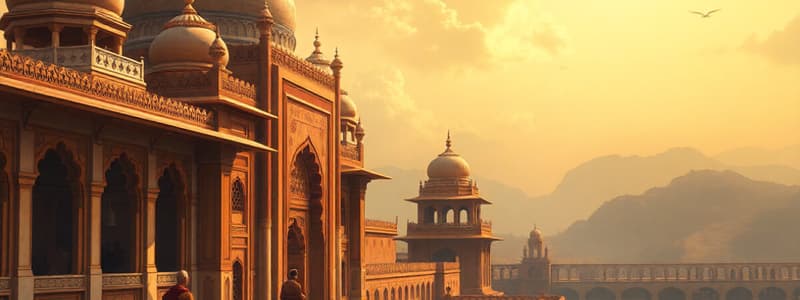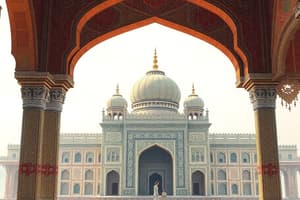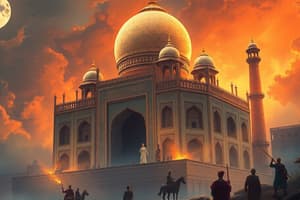Podcast
Questions and Answers
What was one of the greatest errors Aurangzeb committed during his reign?
What was one of the greatest errors Aurangzeb committed during his reign?
- Avoiding ostentation in the royal court
- Suppressing the Marthas
- Imposing the Jizya and pilgrimage tax on Hindus (correct)
- Building the Badshahi Masjid
Aurangzeb was known for his lavish lifestyle and indulgence in luxury.
Aurangzeb was known for his lavish lifestyle and indulgence in luxury.
False (B)
Name the mosque built by Aurangzeb in Lahore.
Name the mosque built by Aurangzeb in Lahore.
Badshahi Masjid
Aurangzeb's constant attention towards the Deccan led to many regions declaring their __________.
Aurangzeb's constant attention towards the Deccan led to many regions declaring their __________.
Match the following causes with their effects on the Mughal Empire:
Match the following causes with their effects on the Mughal Empire:
Who founded the Mughal Empire?
Who founded the Mughal Empire?
The Mughal Empire was founded in 1526.
The Mughal Empire was founded in 1526.
What significant event marked the beginning of Babur's rule in India?
What significant event marked the beginning of Babur's rule in India?
Babur was a descendant of __________ and ___________.
Babur was a descendant of __________ and ___________.
Match the following individuals with their significance in the Mughal Empire:
Match the following individuals with their significance in the Mughal Empire:
Which empires did Babur receive aid from to defeat Ibrahim Lodi?
Which empires did Babur receive aid from to defeat Ibrahim Lodi?
Babur successfully maintained control of both Fargana and Samarkand throughout his life.
Babur successfully maintained control of both Fargana and Samarkand throughout his life.
In what year did Babur die?
In what year did Babur die?
What was one of the primary reasons for Babur's victory over Lodi?
What was one of the primary reasons for Babur's victory over Lodi?
Humayun successfully consolidated his gains after his victory over Sher Shah.
Humayun successfully consolidated his gains after his victory over Sher Shah.
What was Babur's autobiography called?
What was Babur's autobiography called?
Rana Sanga was the Rajput ruler of ______.
Rana Sanga was the Rajput ruler of ______.
What military advantage did Babur utilize that was unknown to Lodi's army?
What military advantage did Babur utilize that was unknown to Lodi's army?
Akbar abolished the Jizya tax levied on Hindus.
Akbar abolished the Jizya tax levied on Hindus.
In which year did the Battle of Khanwa take place?
In which year did the Battle of Khanwa take place?
The ______ was the main source of income for Mughal rulers.
The ______ was the main source of income for Mughal rulers.
Match the following Mughal emperors with their notable actions:
Match the following Mughal emperors with their notable actions:
Who was the regent for Akbar before he took independent control?
Who was the regent for Akbar before he took independent control?
Babur had an extensive reign and was able to consolidate his gains effectively.
Babur had an extensive reign and was able to consolidate his gains effectively.
What was the Mansabdari System introduced by Akbar?
What was the Mansabdari System introduced by Akbar?
Akbar's three-volume history of his reign is known as ______.
Akbar's three-volume history of his reign is known as ______.
What was one of Babur's notable hobbies?
What was one of Babur's notable hobbies?
Akbar's military campaigns focused primarily on expanding the Mughal Empire.
Akbar's military campaigns focused primarily on expanding the Mughal Empire.
Which of the following social reforms did Akbar implement?
Which of the following social reforms did Akbar implement?
Jahangir's reign saw the Mughal Empire losing control over Kandahar to the Persians.
Jahangir's reign saw the Mughal Empire losing control over Kandahar to the Persians.
What title did Jahangir take when he ascended the throne?
What title did Jahangir take when he ascended the throne?
The famous monument built by Shah Jahan in memory of his wife is the __________.
The famous monument built by Shah Jahan in memory of his wife is the __________.
Match the rulers with their notable contributions:
Match the rulers with their notable contributions:
Which of the following did Shah Jahan NOT achieve during his reign?
Which of the following did Shah Jahan NOT achieve during his reign?
Aurangzeb was known as the 'Engineer Emperor'.
Aurangzeb was known as the 'Engineer Emperor'.
Who was the chief minister of Ahmadnagar during Akbar's reign?
Who was the chief minister of Ahmadnagar during Akbar's reign?
Jahangir's wife, who greatly influenced his court, was named __________.
Jahangir's wife, who greatly influenced his court, was named __________.
Which of the following is NOT a structure attributed to Akbar's architectural achievements?
Which of the following is NOT a structure attributed to Akbar's architectural achievements?
Shah Jahan was imprisoned by his son Aurangzeb after a conflict over succession.
Shah Jahan was imprisoned by his son Aurangzeb after a conflict over succession.
Which festival did Akbar actively participate in?
Which festival did Akbar actively participate in?
The architectural style developed during Akbar's reign is known as _________________ architecture.
The architectural style developed during Akbar's reign is known as _________________ architecture.
Match the following Mughal emperors with their significant actions:
Match the following Mughal emperors with their significant actions:
Flashcards
The Mughal Empire's Founding and Timeline
The Mughal Empire's Founding and Timeline
The Mughal Empire was established in 1526 by Babur, a ruler of Uzbek origin, after defeating the Sultan of Delhi, Ibrahim Lodi, in the First Battle of Panipat. Babur's grandson, Akbar, solidified the empire's structure in 1600, which endured until 1720 after the death of Aurangzeb.
Mughal Lineage
Mughal Lineage
The Mughal Emperors were descendants of Genghis Khan on their mother's side and Timur on their father's side. They were proud of their Timurid lineage, as Timur had conquered Delhi. However, they disliked being called Mongol due to the association with Genghis Khan's brutal conquests.
Aurangzeb's Religious Intolerance
Aurangzeb's Religious Intolerance
Aurangzeb's strict religious policies and suppression of other religions alienated many of his subjects, including the Hindus who were already unhappy with his reimposition of the Jizya tax. This led to revolts and weakened the Mughal Empire.
The Rise of the Maratha Empire
The Rise of the Maratha Empire
Signup and view all the flashcards
Weak Mughal Successors
Weak Mughal Successors
Signup and view all the flashcards
Foreign Invasions
Foreign Invasions
Signup and view all the flashcards
Weak Military Organisation
Weak Military Organisation
Signup and view all the flashcards
Akbar's Religious Tolerance
Akbar's Religious Tolerance
Signup and view all the flashcards
Akbar's Social Reforms
Akbar's Social Reforms
Signup and view all the flashcards
Akbar's Architectural Style
Akbar's Architectural Style
Signup and view all the flashcards
Jahangir's Military Campaigns
Jahangir's Military Campaigns
Signup and view all the flashcards
Nur Jahan's Influence
Nur Jahan's Influence
Signup and view all the flashcards
Jahangir's Justice and Diplomacy
Jahangir's Justice and Diplomacy
Signup and view all the flashcards
Shah Jahan's Golden Age of Architecture
Shah Jahan's Golden Age of Architecture
Signup and view all the flashcards
The Taj Mahal
The Taj Mahal
Signup and view all the flashcards
Shah Jahan's New Delhi
Shah Jahan's New Delhi
Signup and view all the flashcards
Aurangzeb's Challenges
Aurangzeb's Challenges
Signup and view all the flashcards
The Sikh Rebellion of Guru Govind Singh
The Sikh Rebellion of Guru Govind Singh
Signup and view all the flashcards
Shivaji's Challenge to Aurangzeb
Shivaji's Challenge to Aurangzeb
Signup and view all the flashcards
Akbar's Notable Structures
Akbar's Notable Structures
Signup and view all the flashcards
The Moti Masjid
The Moti Masjid
Signup and view all the flashcards
The Badshahi Mosque
The Badshahi Mosque
Signup and view all the flashcards
Battle of Panipat (1526)
Battle of Panipat (1526)
Signup and view all the flashcards
Battle of Khanwa (1527)
Battle of Khanwa (1527)
Signup and view all the flashcards
Babur (Founder of the Mughal Empire)
Babur (Founder of the Mughal Empire)
Signup and view all the flashcards
Humayun (Mughal Emperor)
Humayun (Mughal Emperor)
Signup and view all the flashcards
Sur Dynasty
Sur Dynasty
Signup and view all the flashcards
Akbar (Mughal Emperor)
Akbar (Mughal Emperor)
Signup and view all the flashcards
Mansabdari System
Mansabdari System
Signup and view all the flashcards
Zat (Mansabdari System)
Zat (Mansabdari System)
Signup and view all the flashcards
Zamindars
Zamindars
Signup and view all the flashcards
Akbarnama and Ain-i-Akbari
Akbarnama and Ain-i-Akbari
Signup and view all the flashcards
Sulh-i-Kul
Sulh-i-Kul
Signup and view all the flashcards
Ibadat Khana
Ibadat Khana
Signup and view all the flashcards
Mirza Hakim (Akbar's Rebellious Half-Brother)
Mirza Hakim (Akbar's Rebellious Half-Brother)
Signup and view all the flashcards
Prince Salim (Future Emperor Jahangir)
Prince Salim (Future Emperor Jahangir)
Signup and view all the flashcards
Study Notes
Mughal Empire: Foundation and Emperors
- Founded in 1526 by Babur, a chieftain from Uzbekistan.
- Sometimes considered to have started in 1600 with Akbar's rule.
- Lasted until 1720, shortly after Aurangzeb's death.
- Descendants of Genghis Khan (Mongol) and Timur (ruler of Iran, Iraq, and modern-day Turkey).
- Babur (1526-1530 CE): Defeated Ibrahim Lodi at the First Battle of Panipat due to a well-trained, disciplined army, use of artillery, and superior cavalry tactics.
- Defeated Rana Sanga at the Battle of Khanwa in 1527 CE.
- Composed the Baburnama.
- Humayun (1530-1540 & 1555-1556 CE): Faced defeat by Sher Shah's army, lost Delhi and Agra, lived in exile for 15 years, known as a scholar and general but lacked consolidation skills.
- Akbar (1556-1605 CE): Independent ruler, conquered various kingdoms (Chittor, Ranthambore, Gujarat, Bihar, Bengal, Orissa), suppressed revolts.
- Established the Mansabdari System: Rank-based military system determined by Zat (number of soldiers) and Sawar (cavalrymen).
- Implemented Zabt and Zamindars: Tax collection system through intermediaries.
- Commissioned Akbarnama (3 volumes): History of his reign, administration, household, revenues, and details about Indian cultures).
- Introduced religious tolerance by abolishing pilgrim and Jizya taxes, allowing temple construction, participation in Hindu festivals, and translated Hindu texts. Implemented social reforms (prohibiting Sati, child marriage).
- Shah Jahan (1627-1658 CE): Known as the 'Engineer Emperor', shifted capital to Shahjahanabad (Old Delhi), constructed the Taj Mahal, Red Fort, and Jama Masjid, continued Deccan campaigns.
Mughal Empire: Aurangzeb and Decline
- Aurangzeb (1658-1707 CE): Last major Mughal emperor, reimposed Jizya and pilgrim taxes, faced rebellions (Sikhs, Marathas), drained treasury in Deccan campaigns. His religious policies led to conflicts with Rajputs who supported the next generation.
- Factors leading to decline:
- Noble disputes
- Foreign invasions
- Wars of succession
- Weak successors
- Religious intolerance
- Weak military organization
- Corruption in the Mansabdari System.
Important Figures and Systems
- Babur: Founder, Military genius, author of Baburnama.
- Humayun: Scholar, general, faced exile.
- Akbar: Religious tolerance, Mansabdari System.
- Shah Jahan: Architect, Taj Mahal, Red Fort.
- Aurangzeb: Last great Mughal, religious intolerance, faced rebellions.
- Mansabdari System: Rank-based military system.
- Zabt and Zamindars: Tax collection system.
- Akbarnama and Ain-i-Akbari: Chronicles of Akbar's reign.
Studying That Suits You
Use AI to generate personalized quizzes and flashcards to suit your learning preferences.




